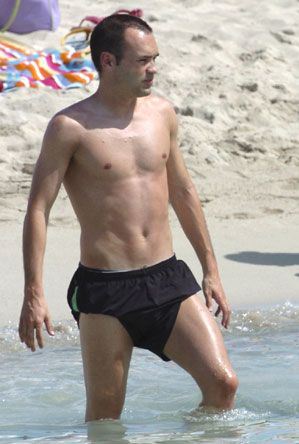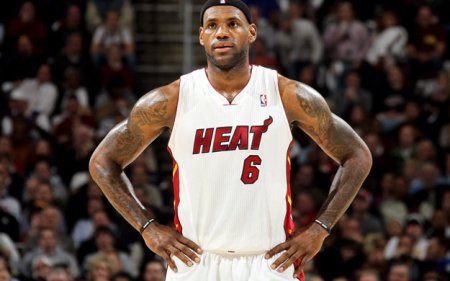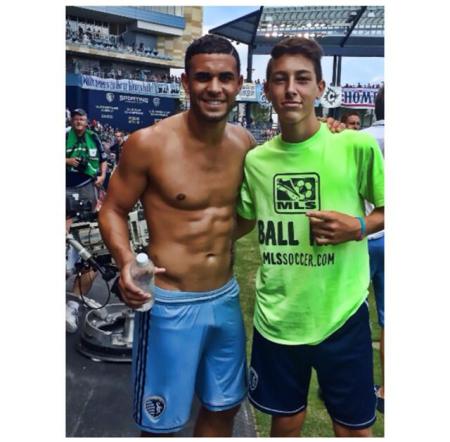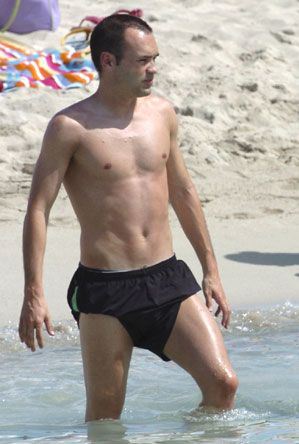|
A question for all higher level coaches to consider. I have a player who's 16, but he can only play for 20 minutes a game. He's small and can't run, thanks to his asthma. Virtually no strength or power thanks to his size, and he obviously can't last long in the matches with his health problems. Not an athlete at all. Interested in taking a look at him at a college showcase or one of his club games? Even better, would an academy bother giving him a second thought if his status was brought up to them? I recently had the pleasure of attending and learning at the NSCAA Director of Coaching course, and we were presented with a small fill-in-the-blank puzzle near the beginning of the course. Let's take that scenario listed above and put it in its proper place: At 16, we could play ____ for only 20 minutes a game. He couldn’t run. He was a little one. Had asthma. No Strength. No power. No athleticism…No endurance. ‘You’ve got a bleeding dwarf,’ I remember somebody said to Brian Kidd (then the youth team coach). ‘You will eat your words,’ said Kidd. If _____ had been at a lesser club, they would have got rid of him and he would probably not be in the game now. We stuck with _____, a wonderful technician. How many caps did he get? Sixty-six. Know the player yet? United fans should have gotten this one right away, as it's Paul Scholes. An argument that comes into debate every month or so is the "best athlete" debate within U.S. Soccer. The idea is as follows: The United States sees its best athletes go on to play American football, basketball, and even hockey or baseball, which means that the "athletes" left over end up with soccer. Because of this, development is stunted and the U.S. National team suffers. If our best athletes, such as Lebron James or Odell Beckham Jr(a recent popular one) played soccer, then we would inevitably become a consistent powerhouse within the world's game. Here's a tangible example of the argument. https://twitter.com/BrittMcHenry/status/544225841266561024 It's one of those arguments that seems to make sense for those on the outside. What's worrying is that some on the inside also promote this belief, and the repercussions it has within the game are frightening. Before we delve into that issue, let's do some investigative research. Who is the world class athlete in these two photos? They're both world class athletes. When we enter into this debate, we have to understand that the idea of an athlete has a thousand different meanings. Perhaps if you want to see a pure athlete, then only watch the Olympics. However, when discussing athletes, it must be relative to the game in which it's played. Lebron James is an athlete, no question about it, but that is within the basketball world. Who could argue that Andres Iniesta is not a world class athlete? Let's keep the debate soccer specific. Who among the following two is a world class athlete? If you saw either at the beach, who would the average observer assume to be a world class athlete? Perhaps Dom Dwyer is “more athletic” than Iniesta, but is there even a question as to who the better player(by a couple thousand miles) is? Here ultimately is the issue. The idea that we don’t have our best athletes playing soccer is flawed because to be successful, we need to promote technicians with the ball, not athletes. We need to promote players comfortable in possession, who understand that moving one yard away into a pocket of space is better than running miles on end during a match. This isn’t to say that a world-class player can’t be fit. Ronaldo is one of the most fit sportsmen in the world but he began his own development by working on his technical ability over thousands of hours. He began to hit the gym with his well-known work ethic only later on when he was in the academy full time.
In the 2014 World Cup, the United States Men’s National Team ran the most collective distance among any team at the tournament. 77.17 miles PER GAME. How could anyone argue that we don’t produce athletes at the highest level. Whenever I talk to S&C Coaches, physios, or even average folk in different parts of the world, the U.S. National Team is lauded for having great athletes. But the issue is always brought up that while we have the athletes, very rarely do we produce the technicians. Michael Bradley covered the most distance among any player in the Group Stages, and yet how was his performance seen by many? The “Better Athlete” argument is dangerous because of it’s reach into youth development within the country and it can have repercussions that take decades to fix. Go back to the Paul Scholes scenario above and tell me how many college coaches, even after seeing him play at 16, would have actively recruited him. How many players do we know that are disregarded by the college system for “Multi-Sport” athletes that are faster and stronger, which for some coaches translates into better. Here’s what happens from the lower level to the highest. The argument is brought up that the U.S. would be dominant if its best athletes were playing soccer. Clubs around the country now have their tryouts, let’s say at Under-8. Because of the age-cutoff date, players who are in many cases 11 months older, larger, stronger, and faster are seen as far superior than smaller players who may be technically just as gifted (if not better) than the older, larger U8’s. What happens now? The athletes are put onto the best teams, and in many cases this means they are given the best coach and better resources. Fast-forward eight to nine years later, and the self-fulfilling prophecy now sees these athletic players being recruited into the college game. They’re able to withstand the rigors of the college game, like distance run required by their coaches with their “tactics” or the strong defenders they’ll face. They play three months out of the year “competitively” but are always given a great winter, summer, and seasonal work-out plan. Athletes are born and bred in the system, and they now graduate from college and enter the MLS and go on to play for the National Team. That’s where we’re at currently. Does every college disregard technicians for athletes? No. However could we honestly say that the scenario above is not the norm for 75-85 percent of the country? The better athlete myth takes soccer and thinks its a matter of “bigger, stronger faster.” It reduces training from younger ages to a matter of running rather than a matter of constant work on the ball. Imagine where Ferenc Puskas would have fit (no pun intended) into this brave new world we’ve created for ourselves. The argument doesn’t begin to look at things such as technical ability or the ability to read the game. The game, ultimately, is dictated by those who can control the ball and make it do whatever they want. The game is not dictated by those who are great at running sprints at the end of practice. What can we do to help? Don’t allow the argument to grow. I saw a session recently for U11 girls, and with five minutes left, the coach ended the game and had the girls kick the balls away to the side. Standing toe to toe on the end-line, they then proceeded to run sprints for the remaining five minutes. Understand that at the one or two sessions a week, that five minutes of sprints will not ultimately shape their future fitness development. However, could spending those extra five minutes, maybe at the beginning or practice, with an intense “touch” workout on the ball help both areas? I think so. We have to continually educate and warn people of the pitfalls of the grandiose claim that if Lebron James played soccer we would have won a world cup. We have to ensure that the focus in this country shifts(and in some areas, it is already) to working on fundamental technical development before we worry about a 2-mile time. It’s an issue that won’t go away overnight, but with constant discussion of the idea, and constant rebuttal with proper reasoning and comparisons, we can make good progress. The best players grew up with a ball at their feet and in many cases, a wall or street to ply their trade. Let’s make sure that the future generation doesn’t grow-up with a stopwatch and a barbell. @pcammarata Follow us on Facebook- The Coaching Journey
7 Comments
11/3/2015 07:12:21 am
The Clash of Clans application can be downloaded from iTunes and has been intended to suit both iPhone and iPad.
Reply
11/14/2015 08:18:34 pm
Every boy in the picture is looking nice but the boy have sky blue trouser is looking very nice specially his six pack is looking very good.
Reply
11/25/2015 08:48:19 pm
Well its very important for all of us if we want to stay fit and active till the end of life to join my regular and daily base activity such like sport. Athletes is one of them and its very great and healthy sport and also profession.
Reply
12/1/2015 07:55:46 am
History can be summed up in three words: creation, fall, recovery. So when you are taking a gander at the religious philosophy of an issue you have to ask: What is its connection to or impression of creation, of the fall, of recovery? In considering the issue of sports, I have added two further words to grow our thought - incarnation and salvation (both which are, obviously, fixed to creation, fall and reclamation).
Reply
9/25/2016 02:49:41 am
good It is definitely an one of the free of charge video tutorial loading application like Hotstar,Movie container and Showbox etc,.It hunts for all greatest video tutorial loading websites for you nice.
Reply
11/30/2016 02:10:30 am
awesome in this overview we are mosting likely to provide the approach which will certainly aid you to mount SHAREit on COMPUTER with no concern nice.
Reply
12/6/2016 03:59:35 am
We provide writing services with brilliant teams of writers who can cover any assignment with expertise!
Reply
Your comment will be posted after it is approved.
Leave a Reply. |




 RSS Feed
RSS Feed